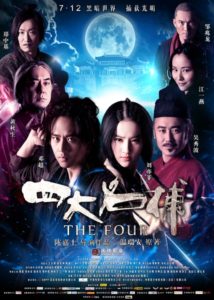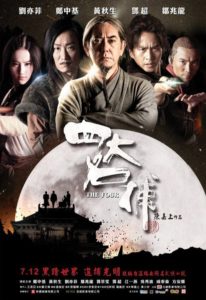The Four
四大名捕
Hong Kong/China, 2012, colour, 2.35:1, 117 mins.
Directors: Chen Jiashang 陈嘉上 [Gordon Chan], Qin Xiaozhen 秦小珍 [Janet Chun].
Rating: 5/10.
Standard, rather old-fashioned, martial-arts mystery generates no real drama.
A city in Ancient China. Six female martial artists, led by Penglai expert Ji Yaohua (Jiang Yiyan), report for duty to Department Six, a powerful state security organisation run by Liu (Cheng Taishen), a lord. Ji Yaohua and her group are assigned to Fourth Constable Han Long (Tang Wenlong) for a case involving a coin cast stolen from the Imperial Mint by Jia San (Tian Qiwen). They surround Drunken Moon Inn where Jia San is arriving to sell the cast; but many other interested parties are also there that night and in the fighting and confusion Jia San escapes. Among those also present are professional debt collector Cui Lveshang (Zheng Zhongji) and members of a secret investigative organisation, Divine Constabulary, which is personally sanctioned by a royal prince (Li Zixiong) and outranks Department Six. Though the coin cast is recovered, Department Six takes over the running of the Imperial Mint and the Treasury Minister, Xu (Zhang Songwen), a lord, is sacked. Following the death of Han Long, Ji Yaohua is given his post,  though she in fact secretly works for An Shigeng (Wu Xiubo), a shipping magnate with special powers who is hatching a dastardly plan. Liu suspends one of his constables, Leng Lingqi (Deng Chao), from duty for a breach of discipline but secretly tells him to infiltrate the Divine Constabulary, which he doesn’t trust. Ji Yaohua, who is attracted to Leng Lingqi, overhears their conversation. Leng Lingqi joins the small organisation, which is run by Zhuge Zhengwo (Huang Qiusheng) and includes crippled mind-reader Sheng Yayu (Liu Yifei) – whom Zhuge Zhengwo adopted after her family was killed – and martial artist Tie Youxia (Zou Zhaolong). Meanwhile, Cui Lveshang has also joined the group. Sheng Yayu is attracted to Leng Lingqi, despite knowing his true character. Zhuge Zhengwo tells his group that the case of the stolen cast is not over yet, and uncovers a scam involving forged currency that could lead to social unrest and bring down the royal family. It sets him and his group against both Department Six and the powerful An Shigeng and his gang of spies.
though she in fact secretly works for An Shigeng (Wu Xiubo), a shipping magnate with special powers who is hatching a dastardly plan. Liu suspends one of his constables, Leng Lingqi (Deng Chao), from duty for a breach of discipline but secretly tells him to infiltrate the Divine Constabulary, which he doesn’t trust. Ji Yaohua, who is attracted to Leng Lingqi, overhears their conversation. Leng Lingqi joins the small organisation, which is run by Zhuge Zhengwo (Huang Qiusheng) and includes crippled mind-reader Sheng Yayu (Liu Yifei) – whom Zhuge Zhengwo adopted after her family was killed – and martial artist Tie Youxia (Zou Zhaolong). Meanwhile, Cui Lveshang has also joined the group. Sheng Yayu is attracted to Leng Lingqi, despite knowing his true character. Zhuge Zhengwo tells his group that the case of the stolen cast is not over yet, and uncovers a scam involving forged currency that could lead to social unrest and bring down the royal family. It sets him and his group against both Department Six and the powerful An Shigeng and his gang of spies.
REVIEW
The first big-screen adaptation of a continuing series of novels by Malaysian-born Wen Rui’an 温瑞安 [Woon Swee Oan] that’s formed the basis for numerous TV drama series in Hong Kong, Taiwan and China (starting with ATV’s The Undercover Agents 四大名捕, 1984), The Four 四大名捕 is a fairly standard martial-arts costume drama that boasts good-looking production design but is let down by a poor script and ordinary direction. Shot in China with a Greater China cast and largely Mainland money, it has the feel more of a 1980s Hong Kong production, but not in a consciously retro style. As with the previous production by Hong Kong veteran Chen Jiashang 陈嘉上 [Gordon Chan], Mural 画壁 (2011), also made with the same Mainland companies and writers, the content fails to live up to the handsome wrapping.
Like Mural, The Four can’t really decide what it is. For those familiar with Wen’s novels and/or the TV adaptations, the many characters don’t need much explanation; but for anyone else, that’s a big problem, as the script is so busy fitting in plot and keeping its large cast occupied that no one really develops any individual thrust. Hong Kong veteran Huang Qiusheng 黄秋生 [Anthony Wong], as the dignified leader of a secret investigative bureau, makes the strongest impression, while his “four constables” (the meaning of the film’s Chinese title) just go through the usual motions of martial-arts heroes. Among them, Hong Kong comedian Zheng Zhongji 郑中基 [Ronald Cheng] (in a long wig) looks rather out of place and Taiwan’s Zou Zhaolong 邹兆龙 [Collin Chou] and Mainlander Deng Chao 邓超 (both in Mural) don’t develop much personality.
Mainland actress Liu Yifei 刘亦菲 (Love in Disguise 恋爱通告, 2010; A Chinese Ghost Story 倩女幽魂, 2011), who plays a wheel-chaired mind-reader with telekinetic powers – a character who’s actually male in the novels – is suitably mysterious but rather a blank page: her love-battle with the swordswoman, played by Jiang Yiyan 江一燕, over the affections of Deng’s character hardly gets off the page. The more talented Jiang (Qiuxi 秋喜, 2009; I Phone You 爱封了, 2011) has her promising moments but is perpetually hamstrung by the script. Among the large cast, it’s Mainland TV actor-singer Wu Xiubo 吴秀波 (the murderer in People Mountain People Sea 人山人海, 2011) who’s most memorable as the jokey, laidback villain of the piece.
Chen, this time co-directing with Hong Kong journeywoman Qin Xiaozhen 秦小珍 [Janet Chun] (The Jade and the Pearl 翡翠明珠, 2010; All’s Well, End’s Well 2012 八星抱喜, 2012) rather than with Gao Linbao 高林豹 (Painted Skin 画皮, 2008; Mural), throws everything into the pot: secret police organisations (but with no sense of menace), shape-shifting powers (but with only so-so effects), martial-arts action (nothing special, with TV-style wire-work), and nods to films like Detective Dee (crime-solving) and My Own Swordsman 武林外传 (2011, the group’s “family” scenes). The result isn’t exactly boring – thanks to the crowded plot and cast – but just very average, with no real tension, drama or thrills.
The imaginative sets by He Jianxiong 何剑雄 [Cyrus Ho] – iron machinery contrasted with wooden constructs – maintain visual interest, as does the well-lit widescreen photography by fellow Hong Konger Li Yaohui 黎耀辉 [Lai Yiu-fai] (Infernal Affairs 无间道, 2002; Wu Xia 武侠, 2011). The score by Li Yunwen 黎允文 [Henry Lai], as in 14 Blades 锦衣卫 (2010) and White Vengeance 鸿门宴 (2011), is weak.
CREDITS
Presented by Beijing Enlight Pictures (CN), China Anhui Radio & TV Station (CN), Top Gun Creative (HK). Produced by Top Gun Creative (HK).
Script: Chen Jiashang [Gordon Chan], Wang Simin, Tan Guangyuan. Novel: Wen Rui’an [Woon Swee Oan]. Photography: Li Yaohui [Lai Yiu-fai]. Editing: Chen Qihe [Chan Ki-hop]. Music: Li Yunwen [Henry Lai]. Production design: He Jianxiong [Cyrus Ho]. Styling: Yu Jia’an [Bruce Yu]. Costume design: Guo Shumin [Petra Kwok], Zhao Ruizhen. Sound: Du Duzhi. Action: Gu Xuanzhao. Visual effects: Ron Simonson (Base F/X, Xing Xing Digital).
Cast: Deng Chao (Leng Lingqi/Leng Xue/Coldblood), Liu Yifei (Sheng Yayu/Wu Qing/Emotionless), Zou Zhaolong [Collin Chou] (Tie Youxia/Tie Shou/Iron Hands), Zheng Zhongji [Ronald Cheng] (Cui Lveshang/Zhui Ming/Life Snatcher), Huang Qiusheng [Anthony Wong] (Zhuge Zhengwo), Jiang Yiyan (Ji Yaohua), Cheng Taishen (Liu/Sheriff King, lord), Wu Xiubo (An Shigeng/The God of Wealth, lord), Deng Cuiwen (Jiao Niang/Aunt Poise, Drunken Moon Inn owner), Li Zixiong [Waise Lee] (prince), Kohata Ryu (Cen Chong/Avalanche), Bao Bei’er (Da Lang/Big Wolf), Fang Anna (Hudie/Butterfly), Wu Yingjie (Dingdang/Dingdong), Miao Chi (Da Yong/Guts), Xiang Tianran (Ling’er/Bell), Zhang Songwen (Xu, treasury minister, lord), Tian Qiwen (Jia San), Tang Wenlong (Han Long), Tang Zhiping (Lei Yiming/Thunderclap), Liu Changde (Xu Feng), Li Shanyu (Xinying/Firefly, female constable), Li Xinye (Chunchan/Cicada, female constable), Qiu Ye (Caiting/Dragonfly, female constable), Li Wanzhen (Fengming/Wasp, female constable), Yu Bo (Huang Kun, Xu’s subordinate), Bai Liwei (peddler), Jiang Junhe (Xiaozhou), Li Guangbo (Xiaoli), Li Ruixue (Ruyi, Jiao Niang’s maid), Lu Shaoshuai, Wu Xiaokui (Department Six constables), Wang Xuehai, Wu Mengyao, Xie Ao (Divine Constabulary constables), Zhang Jufang (mother), Peng Zhi, Li Quanyou, Cao Yuqing, Han Xiquan (peddlers), Kang Jiaqi, Sun Xiaofei, Cui Manli, Xuhu Jiaqian, Shen Bingbing, Jiang Chunqi (An Shigeng’s servant girls), Hou Peng, Ma Yonghao, Wu Gaolin, Bao Wenfeng (suspects), Ge Yufu (gambling-house dealer), Zhang Zhihong (mysterious man), He Yi (Goldblind), Zhu Jiazhen (Wang Xing), Zhan Feng, Li Tao (head workers), Liu Chang, Zhang Qian (An’s maids), Zhang Hao (guard), Li Ying, Zhan Tao (puppet actors).
Release: Hong Kong, 12 Jul 2012; China, 12 Jul 2012.
(Review originally published on Film Business Asia, 19 Jul 2012.)
